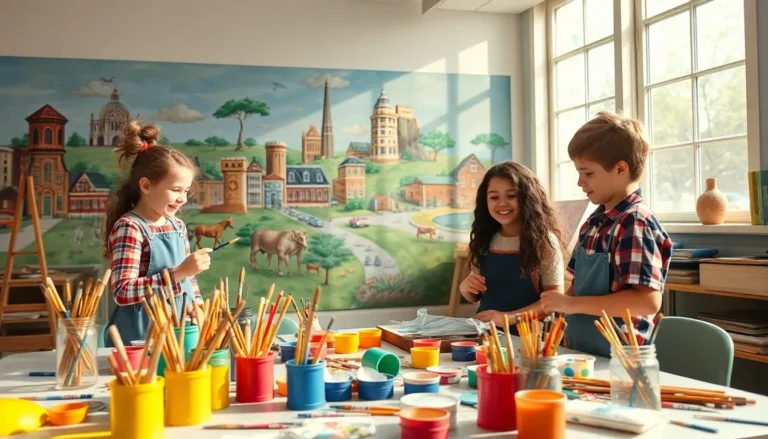Navigating the social jungle of adolescence can feel like trying to dance without stepping on toes. Teen social skills are essential for building friendships, surviving awkward encounters, and mastering the art of small talk. It’s not just about saying the right thing; it’s about reading the room and knowing when to unleash that perfect meme.
In a world where texting often replaces face-to-face interactions, developing these skills is more crucial than ever. Whether they’re trying to impress a crush or make a lasting impression in a group project, strong social skills can help teens thrive. So, let’s dive into the wild world of teen social skills and discover how to turn those awkward moments into opportunities for connection and confidence. After all, who wouldn’t want to be the social butterfly of their high school?
Table of Contents
ToggleImportance Of Teen Social Skills
Social skills play a critical role in the lives of teenagers. These abilities help them navigate friendships, resolve conflicts, and participate in group activities. Forming strong relationships during adolescence is essential for personal development. Mastering social interactions fosters self-esteem and builds confidence.
Collaboration thrives in social environments. Teens proficient in communication tend to excel in group projects, which often require teamwork and negotiation. Engaging in small talk becomes less daunting, setting a solid foundation for future relationships. Handling awkward situations with ease fosters resilience and adaptability.
Face-to-face interactions remain crucial, despite the prevalence of digital communication. Constructing strong social skills prepares teens for real-world scenarios like job interviews and networking. A study by the American Psychological Association emphasizes that effective communication improves academic performance and social adjustment.
Developing empathy and listening skills enhances emotional intelligence. These attributes allow teens to connect more deeply with peers, fostering supportive friendships. Socially skilled teens often find it easier to impress crushes and make lasting impressions.
Encouraging participation in extracurricular activities strengthens social capabilities. Clubs and sports provide opportunities for teens to enhance teamwork and leadership skills. Sharing common interests boosts confidence and facilitates bonding among peers.
Ultimately, enhancing social skills equips teens for future success. Adapting to social environments can turn potential awkward moments into enriching experiences. By prioritizing these skills, teenagers can thrive socially, academically, and emotionally.
Common Challenges Teens Face

Teenagers encounter various challenges that can hinder their social development. Understanding these may help them navigate social environments effectively.
Peer Pressure
Peer pressure significantly impacts decision-making in adolescence. Friends may encourage risk-taking behaviors, influencing choices related to substance use or academic performance. Many teens struggle to assert their individuality in these situations, fearing rejection or ridicule from peers. Additionally, wanting to fit in can lead to compromising values or beliefs. Recognizing the importance of self-awareness helps teens resist negative influences and make choices that align with their true selves.
Social Anxiety
Social anxiety can hinder effective communication among teens. Many feel apprehensive about initiating conversations or participating in group activities. This fear often arises from worries about judgment or embarrassment. Consequently, social situations become overwhelming, impacting friendships and opportunities for engagement. Developing coping strategies, such as practicing conversation skills or engaging in small talk, empowers teens to overcome anxiety and build meaningful connections. Additionally, seeking support from trusted peers or counselors can foster a supportive environment for growth.
Developing Social Skills in Teens
Developing social skills in teens plays a crucial role in their overall growth. Fostering effective communication and empathy creates well-rounded individuals.
Communication Techniques
Effective communication techniques help teens engage more effortlessly with peers. Listening actively enhances conversations, as it shows genuine interest. Using open-ended questions can stimulate discussion and encourage expression. Non-verbal cues, like eye contact and body language, likewise convey confidence and connection. Practicing small talk in everyday situations, such as with classmates or store clerks, builds comfort. Role-playing different scenarios allows teens to prepare for real-life interactions. Emphasizing clarity in speech serves to reduce misunderstandings and fosters stronger relationships.
Building Empathy
Building empathy enables deeper connections among teenagers. Understanding the emotions of others improves relational dynamics. Encouraging perspective-taking exercises fosters compassion and nurtures supportive friendships. Participating in community service instills awareness of diverse experiences. Teens benefit from discussing feelings openly and recognizing their own emotional reactions. Sharing personal stories in group settings shapes trust and rapport. Practicing active listening further enhances empathy, as it deepens the understanding of peers’ experiences. Encouraging teens to express appreciation for others reinforces positive interactions and mutual respect.
Encouraging Social Interactions
Encouraging social interactions is crucial for teenagers as they build essential social skills. Teens can greatly benefit from structured environments where they interact with others.
Extracurricular Activities
Participating in extracurricular activities enhances social interactions. Clubs, sports teams, and volunteer groups offer unique avenues for teens to meet others with similar interests. Engaging in these activities fosters teamwork and cultivates leadership skills. Shared goals within these settings create opportunities for meaningful connections. For instance, participating in a school play or debate club allows teens to collaborate and support one another. This collaboration boosts confidence, as shared challenges lead to stronger friendships and valuable social experiences.
Family Support
Family support significantly influences teenagers’ social skill development. Encouragement from family members helps teens feel more secure in their social environments. Parents and guardians can facilitate communication by modeling effective social interactions. Regular family discussions teach teens how to express thoughts and practice active listening. Engaging in family activities strengthens bonds and creates a supportive atmosphere for practicing social skills. When family members prioritize open communication, teens are likely to approach peers with greater confidence and ease.
Investing in social skills during the teenage years lays the groundwork for a successful future. As teens navigate friendships and group dynamics, these skills empower them to express themselves confidently and connect with others meaningfully. The ability to engage in face-to-face interactions not only enhances personal relationships but also prepares them for professional environments later on.
By embracing opportunities for growth and seeking support from family and peers, teens can transform challenges into valuable experiences. As they develop empathy and communication techniques, they’ll find themselves better equipped to handle the complexities of social life. Prioritizing social skill development is essential for fostering a well-rounded individual ready to thrive in any setting.




